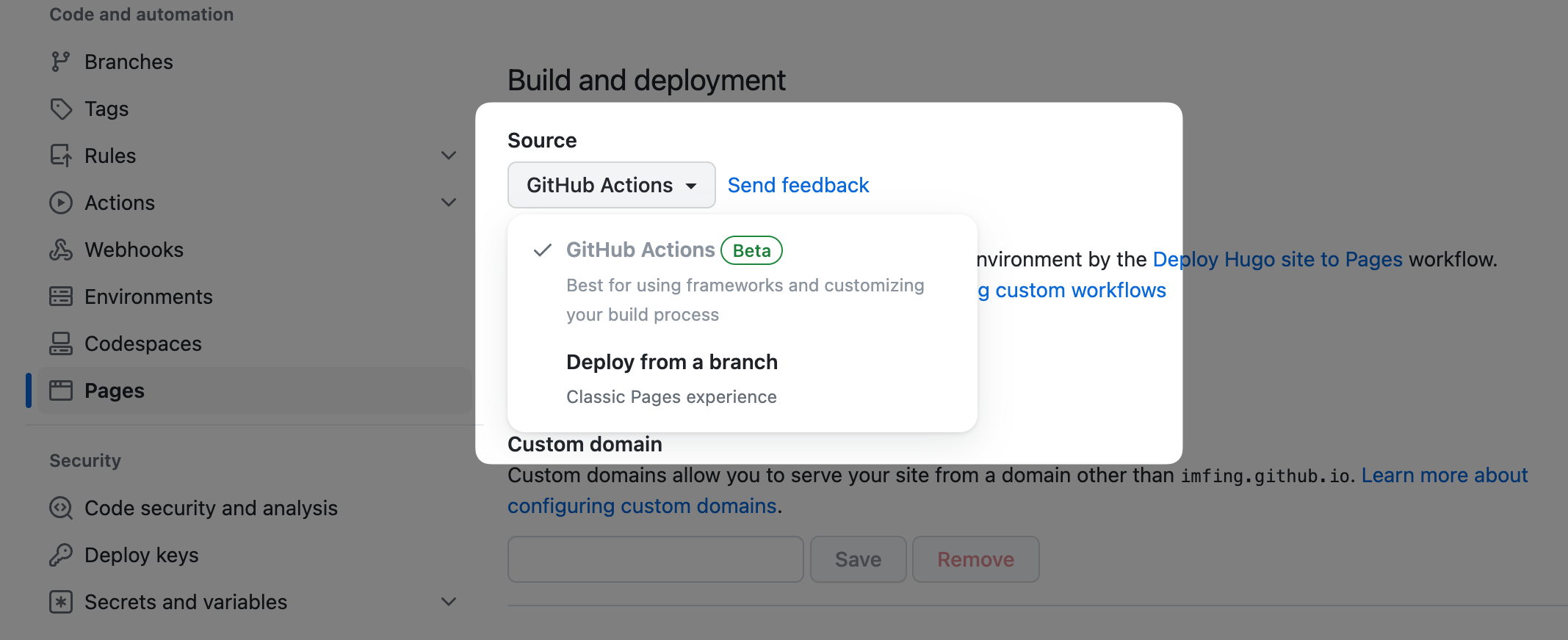2023-10-27 18:09:38 -04:00
---
2024-04-23 22:20:01 +02:00
title: Deploy Site
2023-10-27 18:09:38 -04:00
prev: /docs/guide/shortcodes
next: /docs/advanced
---
Hugo generates static websites, allowing for flexible hosting options.
This page provides guides for deploying your Hextra site on various platforms.
<!-- more -->
## GitHub Pages
[GitHub Pages ](https://docs.github.com/pages ) is the recommended way to deploy and host your website for free.
2023-10-31 09:14:46 +00:00
If you bootstrap the site using [hextra-starter-template ](https://github.com/imfing/hextra-starter-template ), it has provided GitHub Actions workflow out-of-the-box that helps automatically deploy to GitHub Pages.
2023-10-27 18:09:38 -04:00
{{% details title="GitHub Actions Configuration" closed="true" %}}
2023-10-31 09:14:46 +00:00
Below is an example configuration from [hextra-starter-template ](https://github.com/imfing/hextra-starter-template ):
2023-10-27 18:09:38 -04:00
```yaml {filename=".github/workflows/pages.yaml"}
# Sample workflow for building and deploying a Hugo site to GitHub Pages
name: Deploy Hugo site to Pages
on:
# Runs on pushes targeting the default branch
push:
branches: ["main"]
# Allows you to run this workflow manually from the Actions tab
workflow_dispatch:
# Sets permissions of the GITHUB_TOKEN to allow deployment to GitHub Pages
permissions:
contents: read
pages: write
id-token: write
# Allow only one concurrent deployment, skipping runs queued between the run in-progress and latest queued.
# However, do NOT cancel in-progress runs as we want to allow these production deployments to complete.
concurrency:
group: "pages"
cancel-in-progress: false
# Default to bash
defaults:
run:
shell: bash
jobs:
# Build job
build:
runs-on: ubuntu-latest
env:
2024-02-20 22:55:54 +00:00
HUGO_VERSION: 0.121.2
2023-10-27 18:09:38 -04:00
steps:
- name: Checkout
uses: actions/checkout@v4
with:
2024-02-20 22:55:54 +00:00
fetch-depth: 0 # fetch all history for .GitInfo and .Lastmod
submodules: recursive
2023-10-27 18:09:38 -04:00
- name: Setup Go
2024-02-20 22:55:54 +00:00
uses: actions/setup-go@v5
2023-10-27 18:09:38 -04:00
with:
go-version: '1.21'
2024-02-20 22:55:54 +00:00
- name: Setup Pages
id: pages
uses: actions/configure-pages@v4
2023-10-27 18:09:38 -04:00
- name: Setup Hugo
2024-02-20 22:55:54 +00:00
run: |
wget -O ${{ runner.temp }}/hugo.deb https://github.com/gohugoio/hugo/releases/download/v${HUGO_VERSION}/hugo_extended_${HUGO_VERSION}_linux-amd64.deb \
& & sudo dpkg -i ${{ runner.temp }}/hugo.deb
2023-10-27 18:09:38 -04:00
- name: Build with Hugo
env:
# For maximum backward compatibility with Hugo modules
HUGO_ENVIRONMENT: production
HUGO_ENV: production
run: |
hugo \
--gc --minify \
2024-02-20 22:55:54 +00:00
--baseURL "${{ steps.pages.outputs.base_url }}/"
2023-10-27 18:09:38 -04:00
- name: Upload artifact
2024-02-20 22:55:54 +00:00
uses: actions/upload-pages-artifact@v3
2023-10-27 18:09:38 -04:00
with:
path: ./public
# Deployment job
deploy:
environment:
name: github-pages
url: ${{ steps.deployment.outputs.page_url }}
runs-on: ubuntu-latest
needs: build
steps:
- name: Deploy to GitHub Pages
id: deployment
2024-02-20 22:55:54 +00:00
uses: actions/deploy-pages@v4
2023-10-27 18:09:38 -04:00
```
{{% /details %}}
{{< callout > }}
In your repository settings, set the **Pages** > **Build and deployment** > **Source** to **GitHub Actions** :

{{< / callout > }}
2023-10-31 09:14:46 +00:00
By default, the above GitHub Actions workflow `.github/workflows/pages.yaml` assumes that the site is deploying to `https://<USERNAME>.github.io/<REPO>/` .
2023-10-27 18:09:38 -04:00
If you are deploying to `https://<USERNAME>.github.io/` then modify the `--baseURL` :
```yaml {filename=".github/workflows/pages.yaml",linenos=table,linenostart=54,hl_lines=[4]}
run: |
hugo \
--gc --minify \
--baseURL "https://${{ github.repository_owner }}.github.io/"
```
If you are deploying to your own domain, please change the `--baseURL` value accordingly.
## Cloudflare Pages
1. Put your site source code in a Git repository (e.g. GitHub)
2. Log in to the [Cloudflare dashboard ](https://dash.cloudflare.com/ ) and select your account
3. In Account Home, select **Workers & Pages** > **Create application** > **Pages** > **Connect to Git**
4. Select the repository, and in the **Set up builds and deployments** section, provide the following information:
| Configuration | Value |
| ----------------- | -------------------- |
| Production branch | `main` |
| Build command | `hugo --gc --minify` |
| Build directory | `public` |
For more details, check out:
- [Deploy a Hugo site ](https://developers.cloudflare.com/pages/framework-guides/deploy-a-hugo-site/#deploy-with-cloudflare-pages ).
- [Language support and tools ](https://developers.cloudflare.com/pages/platform/language-support-and-tools/ ).
## Netlify
1. Push your code to your Git repository (GitHub, GitLab, etc.)
2. [Import the project ](https://app.netlify.com/start ) to Netlify
3. If you are not using [hextra-starter-template][hextra-starter-template], configure the following manually:
- Configure the Build command to `hugo --gc --minify`
- Specify the Publish directory to `public`
- Add Environment variable `HUGO_VERSION` and set to `0.119.0`
4. Deploy!
Check [Hugo on Netlify ](https://docs.netlify.com/integrations/frameworks/hugo/ ) for more details.
## Vercel
1. Push your code to your Git repository (GitHub, GitLab, etc.)
2. Go to [Vercel Dashboard ](https://vercel.com/dashboard ) and import your Hugo project
3. Configure the project, select Hugo as Framework Preset
4. Override the Build Command and Install command:
1. Set Build Command to `hugo --gc --minify`
2. Set Install Command to `yum install golang`
2023-10-31 09:14:46 +00:00
